Posts Tagged ‘Shield Works’
Is Contract Manufacturing in China Still Viable?

In today’s globalized world, businesses are constantly seeking cost-effective and efficient manufacturing solutions. Contract manufacturing in China has been a go-to option for many companies around the world due to its potential benefits.
However, with the changing economic landscape and geopolitical considerations, is contract manufacturing in China still a viable choice? In this article, we will delve into the advantages and disadvantages of outsourcing manufacturing to China and assess its current viability for businesses worldwide.
Understanding Contract Manufacturing in China
Before diving into the pros and cons, let’s define what contract manufacturing means. Contract manufacturing is the process of outsourcing production to a third-party manufacturer. Companies often opt for this approach to reduce costs, access specialized expertise, and focus on core competencies.
In the context of China, it involves collaborating with Chinese manufacturers to produce goods at a larger scale.
The Pros of Contract Manufacturing in China
Cost-Effectiveness and Labor Availability
One of the primary reasons businesses turn to China for contract manufacturing is its cost-effectiveness. China’s relatively lower labor costs allow companies to manufacture products at a competitive price. Additionally, the country boasts a vast pool of skilled and unskilled labor, offering ample workforce availability for large-scale production.
Technological Advancements and Expertise
Over the years, China has made significant strides in technological advancements. Partnering with Chinese manufacturers grants access to cutting-edge technology and specialized expertise, enabling businesses to produce high-quality products with the latest features.
Supply Chain Efficiency and Infrastructure
China’s well-established supply chain infrastructure plays a crucial role in efficient production and timely delivery of goods. From raw material sourcing to shipping logistics, the country’s well-oiled supply chain ensures a smooth manufacturing process.
Cultural and Language Considerations
China’s unique cultural perspective and language skills can prove advantageous for businesses with a global customer base. Manufacturers in China can better understand and cater to the preferences of diverse markets, ensuring products align with the needs of international consumers.
The Cons of Contract Manufacturing in China
Geopolitical and Trade Uncertainties
The geopolitical landscape can impact contract manufacturing in China. Trade tensions and policy changes between China and other countries may lead to uncertainties, affecting the smooth flow of goods and causing potential disruptions.
Quality Control Challenges
Maintaining consistent product quality can be challenging when manufacturing overseas. Businesses must invest in stringent quality control measures to ensure the products meet international standards and satisfy customer expectations.
Intellectual Property Risks
Protecting intellectual property rights can be a concern when outsourcing to China. Companies must take appropriate legal measures and work closely with manufacturers to safeguard their innovations and prevent counterfeiting.
Communication and Time Zone Differences
Effective communication is essential for successful contract manufacturing. Language barriers and time zone differences may lead to misinterpretations or delays in critical decision-making processes.
Environmental and Ethical Concerns
Outsourcing to countries with lax environmental regulations can raise ethical dilemmas. Businesses must be mindful of their environmental footprint and the ethical implications of their manufacturing choices.
Is Contract Manufacturing in China Still Viable?
With the pros and cons considered, the question remains: is contract manufacturing in China still a viable option for businesses? The answer varies depending on individual business needs, market conditions, and the ability to navigate the challenges associated with outsourcing to China.
Adapting to the Changing Landscape
While China continues to be a major player in contract manufacturing, businesses should adapt their strategies to account for evolving geopolitical and economic landscapes. Diversifying manufacturing locations and exploring other emerging markets can mitigate risks and enhance overall resilience.
Diversifying Manufacturing Strategies
Rather than relying solely on a single manufacturing location, businesses can consider a hybrid approach that involves diversifying their manufacturing strategies. Combining in-house production with strategic partnerships in different countries can offer more flexibility and reduce dependency on a single region.
Contract manufacturing in China still holds potential benefits, but it also comes with challenges, including geopolitical uncertainties, quality control issues, and ethical concerns. Businesses must carefully evaluate their unique needs and risk tolerance before deciding whether to opt for contract manufacturing in China or adopt a diversified manufacturing strategy. If you choose to work with an experienced manufacturer, you can be rest-assured. One like Shield Works is your perfect choice with their adequate experience and vast network of suppliers. Contact us now!
What You Need to Know About Product Design in China
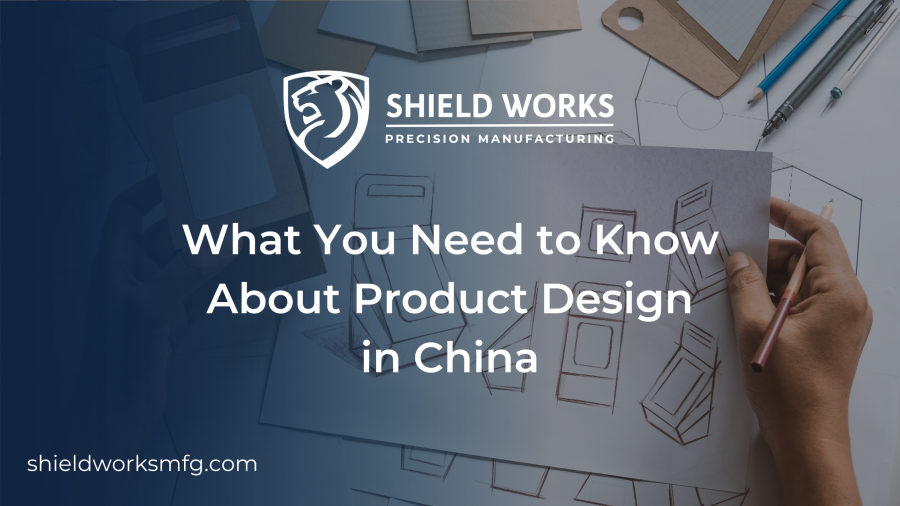
When it comes to product design, China has emerged as a global leader, offering innovative solutions and unparalleled manufacturing capabilities. Whether you are an entrepreneur looking to launch a new product or a business aiming to expand into new markets, understanding the intricacies of product design in China is crucial.
In this article, we will explore the essential aspects of product design in China, shedding light on its benefits, challenges, and market trends. So, let’s dive in and unlock the potential that Chinese product design holds for your business.
The Importance of Product Design in China
Product design plays a pivotal role in the success of any business, and China has become a hub for innovative design solutions. With its vast pool of talented designers and cutting-edge technology, China offers businesses a competitive edge in the global market.
Effective product design enables companies to differentiate themselves, create appealing products, and meet the ever-evolving needs of consumers.
Embracing Innovation and Efficiency
China’s product design landscape is characterized by its commitment to innovation and efficiency. Chinese designers leverage advanced technologies and embrace novel ideas to create groundbreaking products.
By collaborating with Chinese design firms, businesses gain access to fresh perspectives, out-of-the-box thinking, and streamlined design processes, leading to faster time-to-market and enhanced competitiveness.
Understanding the Chinese Consumer
To succeed in China’s vast and diverse market, understanding the preferences and expectations of the Chinese consumer is vital. Chinese consumers have distinct tastes, influenced by cultural factors, social trends, and economic conditions.
By incorporating local insights into product design, businesses can tailor their offerings to align with Chinese consumers’ desires, increasing the chances of market success.
Navigating Intellectual Property Rights
Protecting intellectual property (IP) is a concern for businesses operating in any country, and China is no exception. While China has made significant progress in strengthening IP laws and enforcement, challenges still exist.
Engaging with experienced legal counsel and taking proactive measures can help safeguard your designs and inventions throughout the product design process in China.
Collaborating with Local Design Agencies
Collaborating with local design agencies can provide invaluable advantages when entering the Chinese market. These agencies possess in-depth knowledge of the local industry landscape, consumer behavior, and design trends.
By leveraging their expertise and network, businesses can create products that resonate with the Chinese market, improving market penetration and brand perception.
Cultural Sensitivity and Localization
Culture plays a crucial role in product design, and China’s rich cultural heritage demands careful consideration. Adapting your product to reflect cultural preferences, symbolism, and traditions can significantly enhance its appeal to Chinese consumers.
Localization goes beyond language translation and involves tailoring the design elements, packaging, and marketing strategies to align with the cultural sensibilities of the target audience.
Streamlining the Manufacturing Process
China’s reputation as the “world’s factory” stems from its efficient manufacturing capabilities. When embarking on product design in China, it is essential to collaborate closely with manufacturers.
By involving them early in the design process, businesses can benefit from their expertise and optimize the design for manufacturability, ensuring cost-effectiveness and streamlined production.
Overcoming Language and Communication Barriers
Language and communication barriers can pose challenges when working with Chinese partners. Effective communication is vital to ensure clarity, avoid misunderstandings, and maintain productive relationships.
Employing translators, hiring bilingual staff, or partnering with experienced local professionals can help bridge the language gap and foster effective collaboration throughout the product design journey.
Adapting to Changing Market Trends
The Chinese market is dynamic and constantly evolving. Staying abreast of the latest market trends is crucial for successful product design in China.
By analyzing consumer behavior, market research, and emerging technologies, businesses can identify opportunities for innovation, anticipate market demands, and create products that cater to the ever-changing preferences of Chinese consumers.
Ensuring Quality Control and Compliance
Maintaining quality standards and compliance is essential to build trust and protect your brand reputation.
Working closely with manufacturing partners to establish robust quality control processes, conducting regular inspections, and adhering to relevant regulations and certifications are vital steps to ensure that your products meet the required standards and deliver customer satisfaction.
Product design in China offers businesses a gateway to innovation, efficiency, and market success. As the global business landscape continues to evolve, product design in China remains a vital strategy for businesses looking to thrive in a competitive world. You can also choose to work with a manufacturer like Shield Works, one with their own in-house international team of industrial designers and engineers to craft your vision into a concrete reality. Contact us now!
How Contract Assembly Boosts Productivity

When it comes to product design, China has emerged as a global leader, offering innovative solutions and unparalleled manufacturing capabilities. Whether you are an entrepreneur looking to launch a new product or a business aiming to expand into new markets, understanding the intricacies of product design in China is crucial.
In this article, we will explore the essential aspects of product design in China, shedding light on its benefits, challenges, and market trends. So, let’s dive in and unlock the potential that Chinese product design holds for your business.
The Importance of Product Design in China
Product design plays a pivotal role in the success of any business, and China has become a hub for innovative design solutions. With its vast pool of talented designers and cutting-edge technology, China offers businesses a competitive edge in the global market.
Effective product design enables companies to differentiate themselves, create appealing products, and meet the ever-evolving needs of consumers.
Embracing Innovation and Efficiency
China’s product design landscape is characterized by its commitment to innovation and efficiency. Chinese designers leverage advanced technologies and embrace novel ideas to create groundbreaking products.
By collaborating with Chinese design firms, businesses gain access to fresh perspectives, out-of-the-box thinking, and streamlined design processes, leading to faster time-to-market and enhanced competitiveness.
Understanding the Chinese Consumer
To succeed in China’s vast and diverse market, understanding the preferences and expectations of the Chinese consumer is vital. Chinese consumers have distinct tastes, influenced by cultural factors, social trends, and economic conditions.
By incorporating local insights into product design, businesses can tailor their offerings to align with Chinese consumers’ desires, increasing the chances of market success.
Navigating Intellectual Property Rights
Protecting intellectual property (IP) is a concern for businesses operating in any country, and China is no exception. While China has made significant progress in strengthening IP laws and enforcement, challenges still exist.
Engaging with experienced legal counsel and taking proactive measures can help safeguard your designs and inventions throughout the product design process in China.
Collaborating with Local Design Agencies
Collaborating with local design agencies can provide invaluable advantages when entering the Chinese market. These agencies possess in-depth knowledge of the local industry landscape, consumer behavior, and design trends.
By leveraging their expertise and network, businesses can create products that resonate with the Chinese market, improving market penetration and brand perception.
Cultural Sensitivity and Localization
Culture plays a crucial role in product design, and China’s rich cultural heritage demands careful consideration. Adapting your product to reflect cultural preferences, symbolism, and traditions can significantly enhance its appeal to Chinese consumers.
Localization goes beyond language translation and involves tailoring the design elements, packaging, and marketing strategies to align with the cultural sensibilities of the target audience.
Streamlining the Manufacturing Process
China’s reputation as the “world’s factory” stems from its efficient manufacturing capabilities. When embarking on product design in China, it is essential to collaborate closely with manufacturers.
By involving them early in the design process, businesses can benefit from their expertise and optimize the design for manufacturability, ensuring cost-effectiveness and streamlined production.
Overcoming Language and Communication Barriers
Language and communication barriers can pose challenges when working with Chinese partners. Effective communication is vital to ensure clarity, avoid misunderstandings, and maintain productive relationships.
Employing translators, hiring bilingual staff, or partnering with experienced local professionals can help bridge the language gap and foster effective collaboration throughout the product design journey.
Adapting to Changing Market Trends
The Chinese market is dynamic and constantly evolving. Staying abreast of the latest market trends is crucial for successful product design in China.
By analyzing consumer behavior, market research, and emerging technologies, businesses can identify opportunities for innovation, anticipate market demands, and create products that cater to the ever-changing preferences of Chinese consumers.
Ensuring Quality Control and Compliance
Maintaining quality standards and compliance is essential to build trust and protect your brand reputation.
Working closely with manufacturing partners to establish robust quality control processes, conducting regular inspections, and adhering to relevant regulations and certifications are vital steps to ensure that your products meet the required standards and deliver customer satisfaction.
Product design in China offers businesses a gateway to innovation, efficiency, and market success. As the global business landscape continues to evolve, product design in China remains a vital strategy for businesses looking to thrive in a competitive world. You can also choose to work with a manufacturer like Shield Works, one with their own in-house international team of industrial designers and engineers to craft your vision into a concrete reality. Contact us now!
Tips to Make Your Contract Manufacturing Process in China Easier
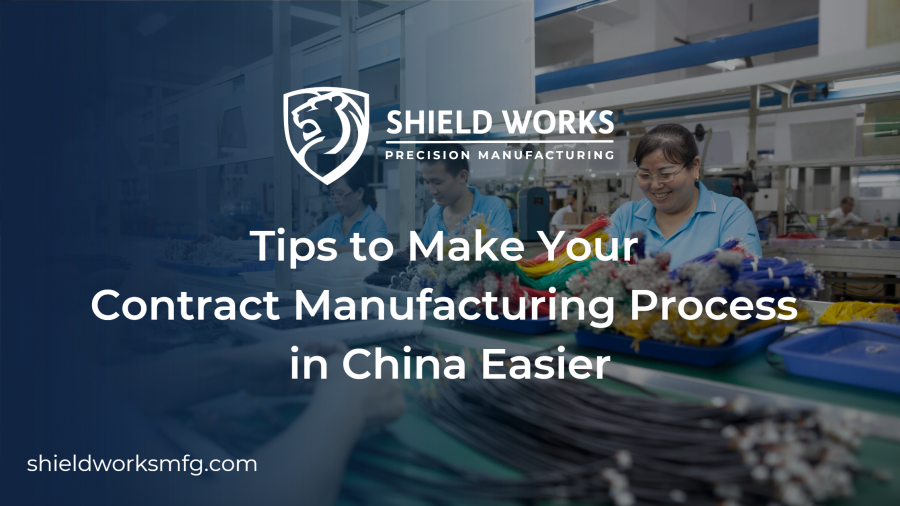
Contract manufacturing in China has become increasingly popular for businesses looking to reduce costs and take advantage of the country’s manufacturing capabilities.
However, navigating the contract manufacturing process in China can be complex and challenging, especially for those who are unfamiliar with the local business practices and cultural nuances.
In this article, we will provide you with valuable tips to make your contract manufacturing process in China easier, enabling you to optimize your operations and achieve successful outcomes.
Understanding the Chinese Manufacturing Landscape
Before diving into the tips, it’s important to have a clear understanding of the Chinese manufacturing landscape. China is renowned for its vast manufacturing infrastructure, which offers a wide range of capabilities and cost advantages.
From electronics to textiles, China has a diverse array of industries capable of meeting various production requirements. Additionally, the country boasts a skilled workforce and a strong supply chain network, further enhancing its appeal as a contract manufacturing destination.
Conduct Thorough Supplier Research
When engaging in contract manufacturing in China, conducting thorough supplier research is crucial. Look for reputable manufacturers with a proven track record in your industry. Request references and samples of their previous work to assess the quality of their products.
Make sure to verify their certifications, licenses, and compliance with international standards. Performing due diligence on potential suppliers will help you identify reliable partners and minimize the risk of working with subpar manufacturers.
Establish Clear Communication Channels
Effective communication is key to a successful contract manufacturing process. Establish clear and open lines of communication with your Chinese manufacturing partner. Overcome language barriers by hiring translators or working with bilingual staff.
Utilize video conferencing tools and project management software to facilitate real-time communication. Regularly scheduled meetings and written documentation can help ensure that both parties are on the same page regarding product specifications, timelines, and any potential issues that may arise during production.
Visit the Manufacturing Facilities
Whenever possible, plan a visit to the manufacturing facilities in China. Seeing the production process firsthand will provide valuable insights into the manufacturer’s capabilities, quality control procedures, and overall operations.
It also allows you to build stronger relationships with the suppliers, fostering trust and understanding. During your visit, take the opportunity to discuss any concerns or questions you may have, and use this face-to-face interaction to establish a solid foundation for a long-term partnership.
Emphasize Quality Control
Maintaining quality control is essential when outsourcing your manufacturing to China. Clearly define your quality standards and expectations, and ensure that your Chinese manufacturing partner understands and implements them effectively.
Implement regular inspections and quality assurance procedures to identify and rectify any issues early on. Conducting third-party inspections and audits can provide an unbiased assessment of the manufacturing process and product quality, offering you additional assurance.
Understand Intellectual Property (IP) Protection
Protecting your intellectual property is of utmost importance when working with Chinese manufacturers. While China has made significant strides in strengthening IP protection laws, it is still crucial to take necessary precautions.
File patents, trademarks, and copyrights in China to safeguard your designs and technologies. Implement non-disclosure agreements (NDAs) and confidentiality clauses to protect your trade secrets. Consult with legal experts who specialize in Chinese intellectual property laws to ensure comprehensive protection.
Build Strong Relationships
Building strong relationships with your Chinese manufacturing partners is a valuable long-term strategy. Cultivate trust and respect through open and transparent communication.
Establishing personal connections through regular visits, cultural exchanges, and social engagements can help foster a strong partnership. Invest time in understanding Chinese business culture and etiquette to avoid misunderstandings. By building strong relationships, you increase the likelihood of receiving priority treatment, improved cooperation, and enhanced mutual understanding.
Plan for Potential Challenges
While contract manufacturing in China offers numerous benefits, it is important to acknowledge and plan for potential challenges that may arise. Be prepared for delays in production, shipping, or customs clearance due to unforeseen circumstances. Maintain buffer time in your project schedule to account for these uncertainties.
Have contingency plans in place to mitigate any risks that may affect your supply chain or production timeline. Being proactive and adaptable will help you navigate challenges and ensure smooth operations.
Engaging in contract manufacturing in China can be a game-changer for businesses seeking cost-effective production solutions. By following these tips, you can streamline your contract manufacturing process and overcome common hurdles.
Remember, with careful preparation and a strategic approach, such as a manufacturer like Shield Works, with their own assembly facility, rich industry experience, and vast network of suppliers, you can make your contract manufacturing process in China easier and reap the benefits of this global manufacturing powerhouse. Contact us to know more!
The 5 Must-Have Qualities of a Reliable Product Manufacturer in China
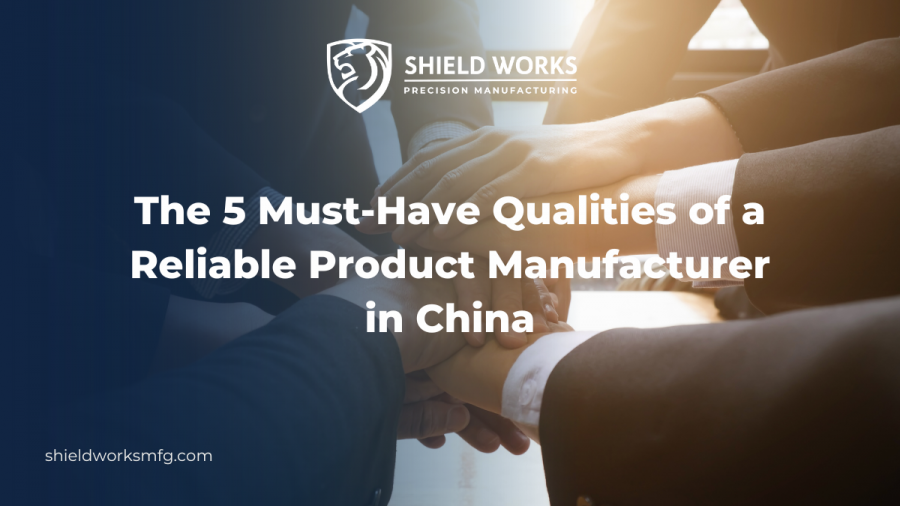
If you’re looking for product manufacturing, you’re in luck. China is one of the world’s largest manufacturers of goods, producing a vast array of items ranging from textiles and electronics to furniture and toys that can be found around the world.
With so many product manufacturers in China to choose from, finding a reliable partner that can fulfill your project without any issues or complications can be a daunting and overwhelming task that requires time and patience. The key to success is to look for manufacturers that possess certain qualities that make them trustworthy and capable of delivering high-quality products.
In this blog post, we’ll explore the 5 must-have qualities of a reliable product manufacturer in China, helping you make informed decisions about your manufacturing partnerships.
Experienced
To start with, the number one main quality that a reliable product manufacturer in China should possess is a level of experience and expertise in their field that is unsurpassed, ensuring that the quality of their products is of the highest possible standard. Ideally, you want to work with a manufacturer that has a solid track record of delivering high-quality products that meet your specific requirements.
In order to gauge a manufacturer’s level of experience, consider factors such as the number of years they have been in business, the types of products they have worked with in the past, and their ability to customize their processes to fit your unique needs.
Honest
In any business relationship, honesty is of the utmost importance, as it helps to create an atmosphere of trust and understanding between the parties involved. A reliable product manufacturer in China must be transparent and truthful in all their dealings with clients. This means that they should be open and straightforward in communicating about their capabilities, pricing, and delivery schedules before signing contracts. It is also crucial for manufacturers to be truthful about the materials and production processes they use. They should not misrepresent or exaggerate the quality of their products or use cheap materials in place of what was agreed upon.
A manufacturer who is not honest about its capacity or process will lead to unexpected delays and costly mistakes that can significantly affect the overall success and operations of your business. In this case, it’s best to avoid working with those who don’t directly respond to your questions, as they may be less likely to provide the support and assistance you need.
Professional
Professionalism is a critical quality of a reliable product manufacturer in China and is one of the most important factors in determining the quality and reputation of their products. This quality includes factors such as promptness, courtesy, and a dedication to providing high-quality products and services.
Professional manufacturers should have a comprehensive understanding of their industry, stay up-to-date with the latest trends and technologies, and have the ability to predict what is coming down the line. They are also willing to offer their valuable advice and insights to their clients, which can be a major asset in helping them to succeed and remain competitive in their respective markets.
Additionally, professional manufacturers understand the importance of customer satisfaction and take every measure to guarantee that their customers are receiving the highest quality products and services possible.
Accountable
No one wants to work with someone who is not fully accountable for their actions, especially when you are financially invested in the deal and need to ensure the outcome is successful.
In this case, it is imperative to ensure that you are partnering with an accountable product manufacturer in China so that you can guarantee the quality and safety of your products. This means that they take responsibility for their actions and are willing to own up to any mistakes or errors that may occur during the manufacturing process.
When a manufacturer is accountable, they are willing to admit their limits on the capacities, which is totally reasonable and understandable because no one can be expected to do everything at the same time, they are still working hard to maximize their capabilities and take steps to rectify the situation. This includes making necessary changes to prevent similar issues from happening again in the future.
Flexible
Outsourcing your production to China can be unpredictable and dynamic, often requiring significant shifts in planning and strategizing to keep up with unexpected changes in production timelines, regulations, and supply chains.
Product manufacturers that can stay agile and adjust quickly to changes in the market can help your business stay on track, avoiding costly delays and any quality issues that could arise from a lack of preparedness.
Some of the key indicators of flexibility in a manufacturer include their ability to customize their production processes to meet your specific needs and preferences. They should also be open to making adjustments to their processes and schedules as needed to accommodate changes in your orders or requirements.
Work With a Reliable Product Manufacturing Company in China
If you’re considering moving your production to China, finding the right product manufacturer who can provide you with the highest quality products and services can make all the difference in your long-term success. It is important to do your research and find a company that meets all of your business needs. By partnering with a trustworthy manufacturer, you can ensure that you are getting quality products at a fair price.
For those who are looking for a reliable manufacturing partner to assist with their project without hassle, Shield Works should be your go-to choice – providing quality results with minimal fuss. We are a British-owned and managed company that specializes in making products according to the highest industry standards and offers a variety of services such as product design, engineering, and production services in a wide variety of fields. Our rigorous approach guarantees the highest quality and consistent service from order placement to delivery. If you have any further questions or would like to know more about what we have to offer, contact us today and we’ll be happy to provide you with more information.
Maximizing Cost Efficiency with Contract Assembly in China
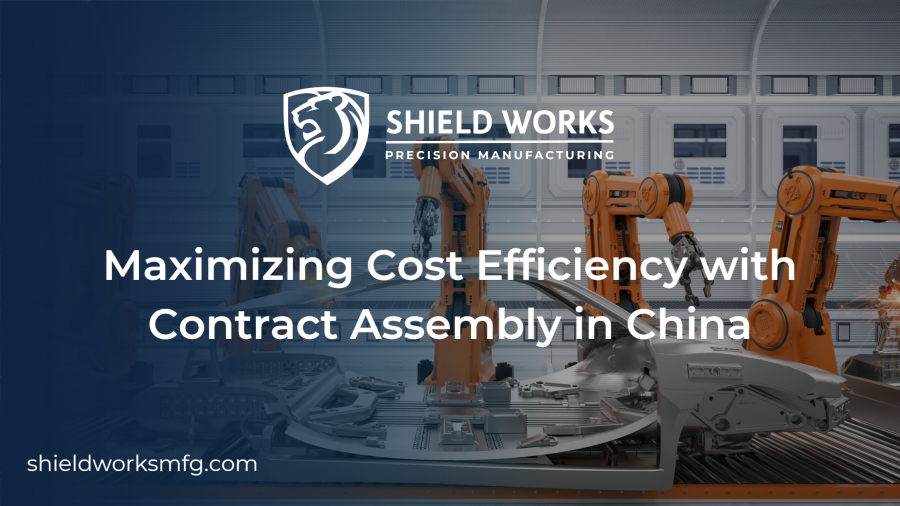
If you’re looking to maximize cost efficiency and streamline your manufacturing process, then you’ve come to the right place. In this article, we’ll dive into the world of contract assembly in China and how it can be a game-changer for your business. By outsourcing your assembly needs to experienced contract manufacturers in China, you can tap into their expertise, infrastructure, and cost advantages to achieve remarkable results. So, buckle up and let’s explore how contract assembly in China can help you boost your business while keeping costs in check!
Why Choose Contract Assembly?
When it comes to manufacturing, time and cost are crucial factors. Contract assembly offers a cost-effective solution that allows you to focus on your core competencies while leaving the assembly work to the experts. By partnering with a reliable contract assembly provider in China, you can save substantial costs associated with infrastructure, equipment, labor, and training.
The Benefits of Contract Assembly in China
1. Cost Efficiency
One of the biggest advantages of contract assembly in China is the significant cost savings it offers. China has a well-established manufacturing ecosystem with a vast network of suppliers, skilled labor, and economies of scale. By leveraging this infrastructure, contract manufacturers can streamline production processes, optimize resource allocation, and negotiate favorable pricing for components and materials. These cost savings can be passed on to you, allowing you to achieve higher profitability and remain competitive in the market.
2. Manufacturing Expertise
China has emerged as a global manufacturing hub, known for its manufacturing expertise and capabilities. Contract assembly providers in China have a wealth of experience in various industries and can handle complex assembly tasks with precision. They possess the technical know-how to tackle challenges efficiently and ensure high-quality output. With their expertise, you can rest assured that your products will be assembled to meet the highest standards of quality and reliability.
3. Scalability and Flexibility
In today’s dynamic business landscape, scalability and flexibility are key to staying ahead of the game. Contract assembly in China offers you the ability to scale your production up or down according to market demand. Whether you need to ramp up production to meet a surge in orders or adjust volumes during slow periods, contract manufacturers can adapt to your needs. This scalability and flexibility provide you with a competitive edge and the agility to respond swiftly to changing market conditions.
4. Reduced Time to Market
Time is of the essence in the business world, and contract assembly can help you accelerate your time to market. By entrusting the assembly process to specialized manufacturers, you can eliminate the need for in-house assembly, which often involves time-consuming setup, training, and coordination. Contract assembly providers in China have established assembly lines, skilled labor, and efficient processes in place, enabling them to deliver products faster and meet your deadlines.
5. Quality Control and Compliance
Maintaining stringent quality control standards is crucial for any business. Contract assembly providers in China understand the importance of quality and adhere to rigorous quality control measures. They implement quality management systems, perform inspections and tests at various stages of the assembly process, and ensure compliance with industry standards and regulations. With their focus on quality, you can have peace of mind knowing that your products will meet or exceed customer expectations.
How to Choose the Right Contract Assembly Partner
Selecting the right contract assembly partner is vital to the success of your outsourcing venture. Here are a few factors to consider when choosing a contract assembly provider in China:
Experience and Expertise
Look for a provider with a proven track record and extensive experience in contract assembly. Assess their industry knowledge, technical capabilities, and the types of products they have assembled in the past.
Quality Assurance
Ensure that the contract manufacturer has robust quality control processes in place. Ask about their certifications, inspection procedures, and commitment to meeting quality standards.
Infrastructure and Capacity
Evaluate the provider’s manufacturing facilities, equipment, and production capacity. Consider whether they have the necessary resources to meet your volume requirements and accommodate future growth.
Communication and Collaboration
Effective communication and collaboration are essential for a successful partnership. Choose a contract assembly provider that demonstrates clear and prompt communication, understands your requirements, and can provide regular updates on the progress of your assembly projects.
Cost Considerations
While cost efficiency is a significant driver for contract assembly, it’s essential to strike a balance between cost and quality. Compare pricing models, explore value-added services, and ensure that the provider offers transparent pricing structures.
You’ve just gained valuable insights into the world of contract assembly in China and how it can help you maximize cost efficiency. By outsourcing your assembly needs to experienced contract manufacturers, you can tap into their expertise, leverage cost advantages, and achieve remarkable results. Remember to carefully evaluate potential partners based on their experience, quality assurance practices, infrastructure, communication, and cost considerations, which make Shield Works you perfect choice with their years of experience and global team members.
So, if you’re ready to take your business to the next level, consider the benefits of contract assembly in China. It’s time to enhance your competitiveness in the market by calling us today!
How Assembly in China Streamlines Your Production

Efficiency is an essential aspect when it comes to manufacturing. Companies tirelessly strive to optimize their production processes, aiming to lower expenses and boost output.
One increasingly popular avenue for achieving these goals is through the practice of assembly in China.
But what precisely makes assembly in China a catalyst for streamlined production? To gain a better understanding, let’s delve deeper into the subject.
The Power of Chinese Assembly
When it comes to manufacturing, China has indisputably established itself as a paramount force on the global stage. The nation’s prowess in assembly and production is unparalleled, owing to a multitude of compelling factors.
Indeed, China’s expansive web of exceptionally proficient laborers, cutting-edge facilities, and a flourishing manufacturing ecosystem form an extraordinary amalgamation that is arduous to rival.
This harmonious convergence engenders a veritable whirlwind of efficiency and efficacy, capable of working marvels for your intricate production endeavors.
Quality Control at its Finest
Against common assumptions, Chinese assembly does not compromise on quality in pursuit of quantity.
As a matter of fact, numerous Chinese manufacturers implement meticulous quality control protocols to ensure that each and every product attains global standards. Through stringent examinations and comprehensive testing, they spare no effort in assuring unparalleled excellence.
Reduced Labor Costs
When it comes to producing your products in China, there is a significant advantage in the form of significantly lower labor costs. Chinese factory workers’ hourly wages are much lower compared to those in many other countries.
As a result, this leads to a decrease in your production expenses, ultimately creating the potential for increased profits in your business ventures.
Experienced Workforce
Collaborating with manufacturers in China presents numerous benefits, among which stands out their exceptionally proficient and seasoned workforce. Throughout the years, China has earned a highly esteemed recognition as a dominant force in manufacturing.
Consequently, a vast reservoir of talent, consisting of adept and well-trained laborers, is readily accessible. Their remarkable expertise plays a pivotal role in ensuring the exceptional quality of your merchandise, providing you with an assurance of unparalleled contentment.
Streamlined Supply Chain
Imagine a vivid scene where your production process unfolds seamlessly, akin to a finely tuned mechanism operating flawlessly. This is precisely the remarkable advantage offered by embracing assembly in China.
It entails a harmonious fusion of an extensive array of suppliers and logistical partners, empowering Chinese manufacturers to deftly oversee the entirety of your supply chain with utmost proficiency.
From the intricate task of sourcing raw materials to the final phase of shipping the finished product, their competence spans the entire spectrum, providing you with comprehensive and reliable support at every step of the way.
Access to a Wide Range of Suppliers
China’s vast network of suppliers presents a seamless opportunity for businesses to acquire essential materials and components required for their manufacturing processes.
This distinct advantage simplifies and expedites the typically arduous and costly task of sourcing materials from numerous suppliers spanning multiple countries.
Faster Production Times
China’s extensive network of factories and robust infrastructure allows for remarkably swift production times compared to other nations.
This advantage not only expedites the delivery of your products to the market but also aids in meeting the surging demand with utmost efficiency.
Greater Flexibility
When collaborating with manufacturers from China, one can experience heightened versatility within the production process. An illustrative instance lies in the capacity to swiftly and effortlessly modify product designs or adjust production schedules as needed.
Such agility empowers businesses to effectively respond to market fluctuations, thereby maintaining a competitive edge.
Embracing Innovation
China’s assembly expertise goes beyond mere efficiency and cost-effectiveness; it extends to the realm of innovation. The nation has emerged as a thriving hub for state-of-the-art technology and groundbreaking manufacturing advancements.
Collaborating with Chinese assembly services unlocks a gateway to the latest and most cutting-edge innovations, ranging from automated production lines to highly advanced robotics. Embracing these innovations has the potential to significantly augment your productivity, minimize errors, and drive your business towards remarkable progress.
A Word on Communication
Years into producing for the world, Chinese manufacturers grasp the significance of seamless communication, going above and beyond by employing English-speaking personnel specifically trained to bridge any linguistic gaps.
Furthermore, revolutionary technological advancements have paved the way for effortless remote communication, making collaboration with your Chinese partners a breeze. Rest assured that your production process will sail smoothly, unfazed by any linguistic obstacles.
There are numerous benefits associated with collaborating with Chinese manufacturers to fulfill your production requirements. Not only can assembly in China lead to decreased labor expenses, but it can also expedite production timelines, thereby streamlining your overall manufacturing process and providing you with a competitive advantage in the market.
If you are contemplating the prospect of engaging with Chinese manufacturers, it is imperative to conduct thorough research and select a reputable partner. It is advisable to seek out a company with a well-established track record of accomplishments, as well as a steadfast dedication to upholding quality standards and ensuring customer satisfaction.
This is precisely what Shield Works embodies. With 18 years of invaluable experience in facilitating the outsourcing of assembly for Western enterprises to the Far East, Shield Works stands as the optimal choice for forging successful partnerships. Feel free to reach out to us today!
OEM Specifications You Should Know for Your Production Line

Are you just engaged in manufacturing? Are you contemplating the establishment of a production line in China? Let me acquaint you with a pertinent piece of information: unraveling the intricate jargon embedded within OEM specifications for your production line is anything but effortless. It presents itself as a multifaceted and formidable undertaking, instilling trepidation in the hearts of many.
However, fret not! Within the confines of this article, we shall plunge into the profound depths of comprehending and decrypting those elusive OEM specifications, ensuring that you possess the indispensable knowledge required to judiciously steer your business towards success.
Thus, without further ado, let us roll up our sleeves and embark upon this enlightening odyssey!
Understanding OEM Specifications
OEM, which stands for Original Equipment Manufacturer, encompasses comprehensive guidelines and prerequisites set forth by the manufacturer to facilitate the production of their merchandise.
These meticulous specifications encompass diverse facets, including materials, dimensions, tolerances, quality benchmarks, packaging, and numerous others.
Unraveling the intricacies of these specifications holds paramount importance in guaranteeing that your production line in China not only aligns with the sought-after standards but also yields top-notch products of exceptional quality.
Materials and Components
The choice of materials and components plays a crucial role in OEM specifications, directly impacting the durability, performance, and overall quality of the end product.
When delving into the intricacies, these specifications carefully detail the specific materials required, encompassing their complex composition and any mandatory certifications or standards.
By paying close attention to these specific details, it becomes easier to source suitable materials while ensuring compliance with the specified guidelines.
Dimensions, Tolerances, and Measurements
Precision plays a critical role in the manufacturing realm, where accurate dimensions and tolerances hold utmost significance. Every component or product adheres to meticulous measurements and tolerances outlined in OEM specifications.
Grasping these specifications becomes imperative to guarantee your production line’s capability to meet the desired precision levels. To accomplish this, it becomes crucial to contemplate suitable measurement tools and techniques that align with the specifications. To uphold accuracy throughout the manufacturing process, diligent calibration and periodic quality checks become indispensable.
Quality Standards and Testing
The intricate realm of manufacturing thrives upon the bedrock of exacting dimensions and tolerances, for they hold paramount importance. To embark upon this journey of precision, original equipment manufacturer (OEM) specifications unveil an elaborate tapestry of meticulous measurements and tolerances, meticulously crafted for each component or product.
Grasping the essence of these specifications becomes an indispensable endeavor, as it serves as the beacon guiding your production line towards the coveted realm of accuracy. It becomes imperative, then, to engage in thoughtful contemplation regarding the selection of measurement tools and techniques that will harmonize flawlessly with the stipulated requirements.
In this grand orchestration, unwavering calibration and conscientious quality checks assume a momentous role, dutifully upholding the mantle of precision throughout the entire manufacturing process.
Packaging and Labeling Requirements
The role of packaging and labeling in product presentation and protection cannot be overstated. When it comes to packaging and labeling, following OEM specifications becomes paramount. These specifications encompass a range of aspects, such as the choice of packaging materials, labeling requirements, branding guidelines, and more.
By adhering to these specifications, you guarantee consistency and professionalism in how your products are packaged and labeled. This, in turn, creates a positive impact on the overall customer experience. So, paying attention to the intricate details of packaging and labeling is crucial for your brand’s success.
Compliance with Regulatory Standards
When exploring beyond the OEM specifications, it becomes crucial to contemplate and abide by relevant regulatory standards. Given the uniqueness of your products and the domain you operate in, it is conceivable that particular regulations and certifications require fulfillment. These requirements may include safety standards, environmental regulations, and product certifications.
Comprehending and integrating these regulatory obligations into your production line is essential to guarantee legal compliance and product safety. Acquaint yourself with the applicable regulations and collaborate closely with your OEM partners to ensure that the production process aligns with these standards. Conducting regular audits and quality checks can aid in confirming compliance and pinpointing areas for enhancement.
Continuous Improvement and Iteration
Decoding OEM specifications is an ongoing endeavor that demands a steadfast dedication to progress. Through accumulating experience and heeding input from customers and suppliers, you are bound to unearth opportunities for enhancing your production line. Embrace the notion of perpetual refinement and iteration to optimize both your processes and the quality of your products.
Frequently assess the performance of your production line, diligently pinpointing areas primed for improvement. This may entail scrutinizing production data, conducting meticulous root cause analyses to address any issues that may arise, and actively seeking feedback from key stakeholders.
By fostering a culture centered around continuous improvement, you can heighten efficiency, curtail wastage, and consistently deliver products that not only meet but surpass the OEM specifications.
Leveraging Technology and Automation
The ever-evolving technological realm of today presents an opportune moment to harness the power of automation and cutting-edge advancements, enabling you to unravel the intricacies of OEM specifications and seamlessly optimize your manufacturing operations in China.
Within this landscape, an array of software tools and automated systems stands ready to monitor and regulate crucial facets of the production process.
To truly unlock the potential of your operations, the implementation of an enterprise resource planning (ERP) system emerges as a pivotal choice. Through this solution, you gain instant access to real-time insights into production data, inventory management, and the labyrinthine logistics of the supply chain.
Armed with such comprehensive knowledge, you can forge a path guided by data, promptly detecting any deviations from the OEM specifications. Furthermore, the integration of quality control systems and automated inspection processes acts as a formidable force, bolstering accuracy, efficacy, and diminishing the possibility of human error.
By wholeheartedly embracing technology and automation, a realm brimming with opportunities, you inaugurate a realm of heightened productivity, fortified by meticulous quality control measures. Your production line assimilates seamlessly into the realm of OEM specifications, yielding results that defy predictability and ascend to new heights of excellence.
Decoding OEM specifications requires attention to detail, effective supplier communication, regulatory compliance, continuous improvement, and strategic use of technology. Prioritize these areas for a production line that meets OEM specifications and delivers high-quality products.
With this knowledge, confidently set up your production line in China. Adapt your processes as you navigate the complexities of OEM specifications, positioning yourself for success in manufacturing.
You can also choose to partner with a manufacturer like Shield Works, well-seasoned with 18 years of industry experience and have all the knowledge it takes free your OEM from all the hassles. Take to us today!
Must-Know Common Product Assembly Defects for Your Business Success

When importing goods, product assembly defects can pose a significant challenge for businesses. The consequences of discovering that your products are defective or hazardous after selling them to customers can be dire. In this article, we’ll dive into some of the most common assembly defects that can arise during a product manufacturing process and provide you with tips to steer clear of them.
Poorly Designed Molds
During the manufacturing process, molds are employed to give shape to the product. If the molds are poorly designed, they may produce misshapen or flawed products.
Precision molds, in particular, are critical for plastic products like toys. A mold that’s inadequately designed can also result in malfunctioning products that could pose a risk to the consumer.
To prevent this problem, it’s imperative to collaborate with a reputable manufacturer that has experience designing and manufacturing top-notch molds. A good manufacturer would typically have a team of engineers and designers who can develop molds that meet your requirements and are of exceptional quality.
They should also possess the appropriate equipment to create the molds and undertake quality control checks to verify that they meet the necessary standards.
Misaligned Parts
When the components of a product are not properly aligned during assembly, misaligned parts can occur, which can lead to unstable products that may break apart and cause safety hazards for users.
For instance, a child’s toy that is not assembled well can pose a significant risk of injury. To prevent misaligned parts, it is crucial to implement rigorous quality control measures, such as conducting visual inspections and testing finished products.
Additionally, manufacturers should have a dedicated quality control team that carries out checks throughout the manufacturing process to ensure that all components are assembled correctly.
By doing so, the likelihood of misaligned parts can be minimized, ensuring that the final product is both safe and reliable.
Poor Quality Control
Assembly defects can often be traced back to poor quality control, making it critical to have robust quality control processes in place. By adhering to these processes, manufacturers can ensure that their products meet safety standards and are of the highest quality.
To minimize the risk of defects, it’s crucial to choose a manufacturer with a strong quality control system in place. Such a manufacturer should have a dedicated team responsible for checking all products before shipping and conducting regular audits to identify opportunities for improvement in their production processes.
This approach will help ensure that the products are consistent, reliable, and meet consumer expectations.
Inconsistent Materials
When it comes to product assembly, using inconsistent materials can lead to defects. The variation in material quality can make it challenging to achieve consistency in the end product. The outcome may be products that are unsightly or malfunctioning.
To prevent this issue, it’s crucial to ensure that your manufacturer sources materials of high quality and implements a reliable system to detect inconsistencies in the materials.
This may involve conducting tests on materials before they are used in production and maintaining consistent material suppliers.
Furthermore, manufacturers must carry out routine quality control checks on materials to ensure that they meet the required standards.
Improperly Installed Components
Inadequately installed components may give rise to assembly defects, which occur when a component is improperly installed during the manufacturing process. This may lead to products that are either unfit for their intended purpose or unsafe for consumers.
To steer clear of such problems, it is essential to implement a rigorous quality control process to verify that all components are installed correctly. This process can include thorough visual inspections and testing of finished products.
Moreover, manufacturers should establish a quality control team that is accountable for scrutinizing all components before they are assembled into finished products. By doing so, they can prevent potential complications and ensure that their products meet the highest quality standards.
Lack of Training
Poorly trained workers can cause defects in products, in addition to using inconsistent materials. To avoid this, it’s crucial to collaborate with manufacturers that have a highly skilled and trained workforce.
It’s important for workers to receive proper training on how to operate equipment, assemble products, and follow safety protocols to avoid errors during the manufacturing process that could lead to defects.
Insufficient training could also put workers at risk of facing safety hazards. Therefore, it’s necessary to ensure that the manufacturer you choose implements a training program for its employees and provides regular updates on new processes and procedures to maintain high standards.
Imported products from can suffer from product assembly defects that pose a significant problem for businesses. To avoid these costly mistakes, it’s important to identify the common causes of these defects and take necessary measures.
Moreover, a robust quality control system should be in place to ensure the safety and durability of your products. By following these guidelines, you can minimize the risk of defects and guarantee that your products meet the highest standards of excellence.
Collaborating with a reliable manufacturer that has extensive experience in designing and producing superior quality products can help you achieve just that. Shield Works is a well-seasoned manufacturer with 18 years in the industry and a full-fledged in-house assembly facility housing an IPR-protective zone of production, as well as partnerships with 500+ suppliers. Contact us today!
7 Essential Questions to Ask Before Choosing a Product Manufacturer
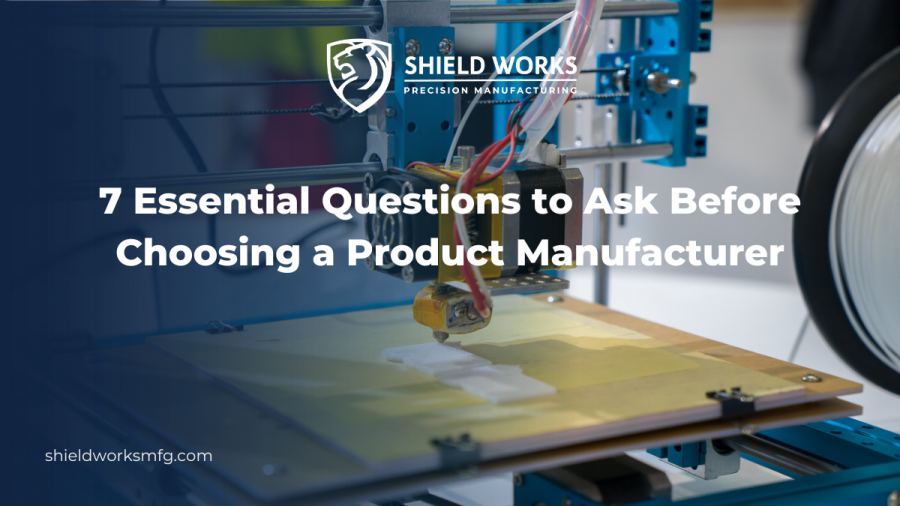
Running a business of any kind can be challenging, but it can be especially difficult when you’re attempting to mass produce any kind of product. Product creation requires a lot of attention to detail and care, and it’s one of the more challenging tasks modern business owners have to face.
Choosing the right product manufacturer is an essential part of the success of this kind of business.
A product manufacturer can make or break a company, so it’s important to make sure you choose the right one. Selecting a manufacturer is more than just finding the lowest price or the quickest delivery time. You need to consider a variety of factors.
What are some essential questions to ask before choosing a product manufacturer? What do you need to know before deciding who the best manufacturer for you is? Read on and we’ll walk you through the basics.
1. What Is Your Experience in my Industry?
When searching for a product manufacturer, you want to look for one that has experience in your industry or a related one.
This experience ensures that the manufacturer understands the specific needs and requirements of your products. It also means they have a network of suppliers, know how to troubleshoot common manufacturing issues, and have a better understanding of industry standards and regulations.
Ask the manufacturer about the products they have manufactured in the past and if they have any specific experience with your industry.
You should also ask for references and reach out to those customers to learn more about their experience working with the manufacturer.
2. What Is Your Production Capacity?
Production capacity refers to the number of products a manufacturer can produce in a specific time frame. It’s essential to know if the manufacturer can handle your order volume, both in terms of quantity and time frame.
If you’re planning on scaling your business in the future, it’s crucial to choose a manufacturer that can grow with you.
Some manufacturers may have minimum order requirements that may not fit your business needs.
Ask about these minimums and the maximum order quantities they can handle. Also, ask about their lead times and how flexible they are in accommodating urgent orders or last-minute changes.
3. How Do You Handle Quality Control?
Quality control is a critical aspect of manufacturing products. You want to ensure that your products meet your customers’ expectations and are safe to use. A manufacturer with a quality control process in place can help you achieve this goal.
When choosing a manufacturer, ask about their quality control process and how they ensure that each product meets your specifications.
Ask if they have any certifications or awards that demonstrate their commitment to quality. You should also ask if they have any testing facilities to test the materials and products they manufacture.
4. What Is the Lead Time?
Lead times refer to the amount of time it takes for the manufacturer to produce and deliver your products. It’s crucial to understand the lead times upfront to plan your inventory levels and fulfill customer orders.
When discussing lead times with the manufacturer, ask about the average lead times and any factors that may impact them. For example, a manufacturer may have longer lead times during peak seasons or when there are supply chain disruptions.
You should also ask if they have a buffer stock or backup plan in case of any delays.
5. How Does the Pricing Structure Work?
Price is an essential factor when choosing a manufacturer. You want to ensure that the manufacturer’s pricing is competitive and fits within your budget.
However, you also need to consider the overall value that the manufacturer provides, such as quality, reliability, and communication.
When discussing pricing with the manufacturer, ask about the pricing structure and if there are any discounts available for bulk orders or long-term partnerships.
You should also ask about any additional costs, such as shipping, packaging, or customization.
6. How Do We Plan to Communicate?
Effective communication is critical to a successful partnership with your manufacturer. You want to ensure that you can easily communicate your needs, concerns, and expectations with the manufacturer.
When choosing a manufacturer, ask about their communication process and how they will keep you updated on the production process.
Do they have a dedicated account manager or project manager? Will you have access to a communication portal or software? You should also ask about their response times to inquiries and how they handle any issues that may arise.
7. What Are Your Sustainability and Social Responsibility Policies?
Consumers are becoming increasingly aware of the environmental and social impact of the products they purchase.
Choosing a manufacturer with sustainability and social responsibility policies can help you meet the expectations of your customers and make a positive impact on the planet.
Ask your potential partners about their policies on waste reduction, energy efficiency, and ethical labor practices. Do they have any certifications that demonstrate their commitment to social responsibility? You should also ask about any sustainability reports or initiatives they have implemented.
Questions to Ask a Product Manufacturer
Choosing the right product manufacturer is a critical decision for any business operator. It can have a significant impact on the success of your business.
By asking these essential questions, you can ensure that you choose a manufacturer that can meet your needs while providing high-quality products. This can ultimately drive the success of your business as a whole.
Need more information about proper product assembly? Curious about how to improve your business products? Give us a call anytime for help.
